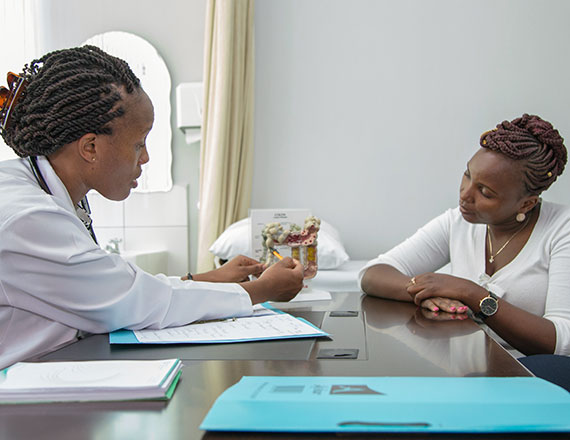Colon Cancer Screening
Colon cancer is rapidly increasing in Africa. In Kenya colorectal cancer is among the top ten cancers.
Almost all colon cancers start out as a polyp on the inside wall (lumen) of the colon. Polyps start out as small wart-like bumps the size of peanut.
Colon Polyps
Over a period of 5-10 years, some of these polyps continue to grow up to 1-2 inches in diameter. At any time a microscopic size cancer (adenocarcinoma) may develop somewhere on the polyp. This usually will occur in polyps greater than 1 cm (a little less than 1/2 in.) in diameter.
Once a cancer starts, it will eventually spread throughout the polyp, into the wall of the colon, then through the wall into surrounding tissues, lymph nodes, and possibly to the liver and/or lungs.
We don’t know what percent of polyps become cancers. Approximately 40% of people over the age of 50 have polyps and about 5% of the population will eventually develop colon cancer so we guess that 10 – 15% of patients with polyps will eventually develop colon cancer.
We also don’t know the factors involved in what causes polyps or what causes polyps to be malignant (cancerous). Much of the risk is genetic. This is some weak evidence that you are more likely to develop colon cancer if you are overweight, smoke, drink excessively, don’t exercise, and eat a diet that is high in animal fats and low in fiber, fresh fruits, and vegetables.
Some supplements that have been proposed to lower the risk of colon cancer (but none proven) include calcium (1200 mg/d), fiber supplements, vitamin E (200-400 IU/d). vitamin C (500 – 1000 mg/d), folic acid (400 mgm/d) and NSAID/aspirin use.
The best way to detect colon cancer is to undergo periodic screening on order to detect polyps before they become malignant. Taking into consideration risk and cost, the best test to screen for colon cancer is to undergo a colonoscopy at age 50 and every 10 years after that until age 80.
Some patients are at higher risk due to family history of colon cancer or polyps, presence of inflammatory bowel disease and need more frequent exams beginning at age 40 or earlier. Please let us know if you have colon cancer or polyps in the family. Once polyps are detected, you should have a colonoscopy every 3-5 years to detect new polyps.
Eating a healthy diet, exercising, not smoking, limiting alcohol consumption to no more than 2 drinks per day, and avoiding obesity is a good way to prevent heart disease, strokes, and many cancers.
However, the most effective method of preventing colon cancer is regular screening. Please consider undergoing these tests, not only for yourself, but your loved ones as well.
